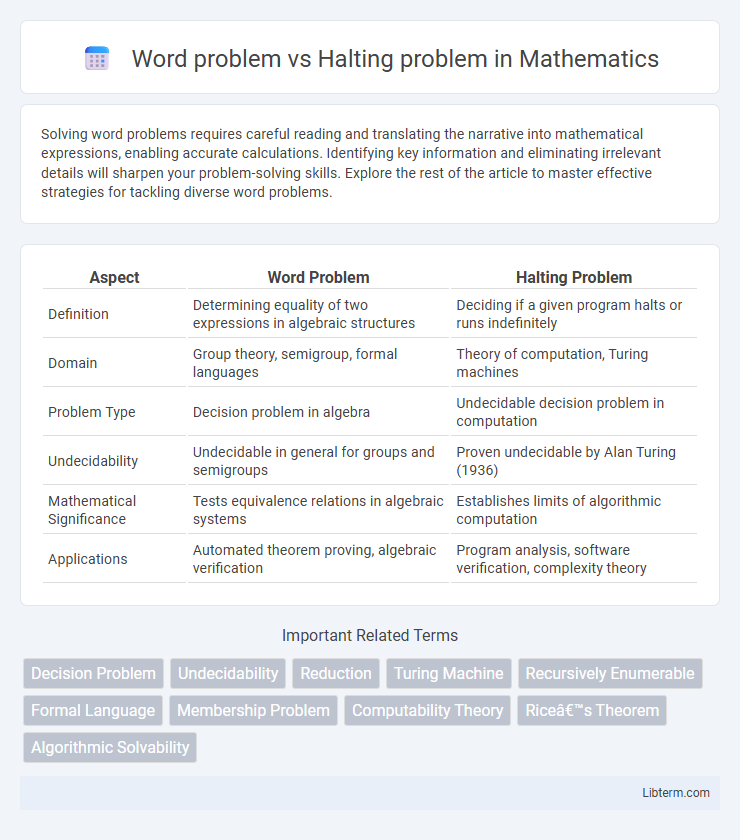Solving word problems requires careful reading and translating the narrative into mathematical expressions, enabling accurate calculations. Identifying key information and eliminating irrelevant details will sharpen your problem-solving skills. Explore the rest of the article to master effective strategies for tackling diverse word problems.
Table of Comparison
| Aspect | Word Problem | Halting Problem |
|---|---|---|
| Definition | Determining equality of two expressions in algebraic structures | Deciding if a given program halts or runs indefinitely |
| Domain | Group theory, semigroup, formal languages | Theory of computation, Turing machines |
| Problem Type | Decision problem in algebra | Undecidable decision problem in computation |
| Undecidability | Undecidable in general for groups and semigroups | Proven undecidable by Alan Turing (1936) |
| Mathematical Significance | Tests equivalence relations in algebraic systems | Establishes limits of algorithmic computation |
| Applications | Automated theorem proving, algebraic verification | Program analysis, software verification, complexity theory |
Introduction to the Word Problem and Halting Problem
The Word Problem in group theory asks whether two words representing elements in a finitely presented group are equivalent, posing challenges in computational algebra and logic. The Halting Problem concerns deciding if a given Turing machine will halt on an input or run indefinitely, establishing a fundamental limit in computability theory. Both problems highlight essential boundaries of algorithmic solvability but differ in their context and implications within mathematics and computer science.
Historical Context: Origins of Both Problems
The Word Problem in group theory was first formulated by Max Dehn in 1911 as part of foundational work in combinatorial group theory, seeking algorithms to determine if two words represent the same group element. The Halting Problem, introduced by Alan Turing in 1936, arose from investigations into the limits of computation and formal systems, proving that no general algorithm can decide whether arbitrary programs halt. Both problems highlight early 20th-century efforts to formalize mathematical decision processes and expose fundamental boundaries in algorithmic solvability.
Formal Definitions: Word Problem Explained
The Word Problem in group theory asks whether two words, composed of generators and their inverses, represent the same element in a given group defined by generators and relations. Formally, the Word Problem for a group G with presentation is to decide if a word w in the alphabet S+-1 equals the identity element in G. This contrasts with the Halting Problem in computability theory, which concerns determining whether an arbitrary Turing machine halts on a given input.
Formal Definitions: Halting Problem Explained
The Halting Problem is formally defined as the decision problem of determining, given a description of a program and an input, whether the program will eventually halt or run indefinitely. It is proven undecidable by Turing, meaning no algorithm can solve this problem for all possible program-input pairs. In contrast, a Word Problem generally involves deciding equivalence or membership within a formal language or algebraic structure, often requiring different computational approaches.
Computational Complexity Comparison
The Word problem in group theory often falls into decidable classes with known complexity bounds depending on the group's presentation, while the Halting problem is famously undecidable, indicating no algorithm can determine termination for all possible program-input pairs. From a computational complexity perspective, Word problems can sometimes be solved in polynomial time or exponential time based on group properties, whereas the Halting problem transcends complexity classes by being non-computable. This stark difference highlights the boundary between decidable algorithmic problems analyzed by complexity theory and inherently undecidable problems proven by computability theory.
Decidability: What Makes a Problem Solvable?
The Word Problem in group theory is decidable for some classes of groups, such as free groups and finite groups, where an algorithm can determine if two words represent the same element. In contrast, the Halting Problem, which asks whether an arbitrary computer program halts on a given input, is provably undecidable because no algorithm can solve it for all possible inputs. Decidability hinges on the existence of an effective procedure that always terminates with a correct yes-or-no answer, highlighting fundamental limits in computational solvability.
Key Differences Between the Word Problem and Halting Problem
The Word Problem in group theory involves determining whether two words represent the same element in a finitely presented group, relying heavily on algebraic structures and combinatorial methods. The Halting Problem, fundamental in computability theory, asks whether a given program will halt or run indefinitely, focusing on algorithmic undecidability. Key differences include the Word Problem's dependency on algebraic group presentations versus the Halting Problem's roots in Turing machine behavior and its proof of undecidability that applies universally across computational systems.
Real-world Applications and Significance
The Word problem in group theory and the Halting problem in computability highlight fundamental limits in algorithmic problem-solving, crucial for cryptography and software verification. The Word problem's decidability impacts automated theorem proving and algebraic computations, enabling advancements in symbolic computation systems. The Halting problem underscores inherent constraints in predicting program behavior, influencing software debugging tools and the development of secure, reliable computing systems.
Impact on Computer Science and Mathematics
The Word problem, which involves determining equivalence of words in algebraic structures, significantly advanced formal language theory and automated theorem proving within computer science, influencing complexity theory and group theory in mathematics. The Halting problem, proven undecidable by Alan Turing, established fundamental limits on algorithmic computability, shaping the theory of computation and complexity classes. Both problems underscore the boundaries of decision problems, profoundly impacting algorithm design, computational logic, and the development of modern computer science foundations.
Future Directions and Open Questions
Future directions in the study of the Word problem and the Halting problem involve exploring new algorithmic approaches and complexity classifications within group theory and computability theory. Researchers are investigating the boundaries of decidability and the impact of quantum computation on traditionally undecidable problems. Open questions include whether subsets of the Word problem can be efficiently solved by emerging computational paradigms and how insights from the Halting problem might inform broader classes of decision problems.
Word problem Infographic

 libterm.com
libterm.com